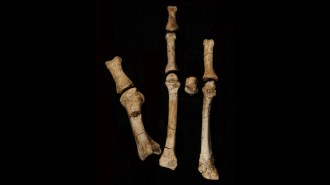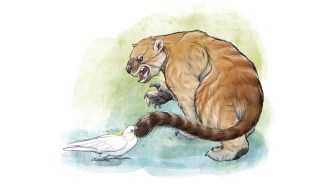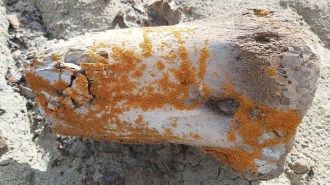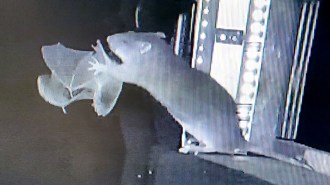News
-
 Climate
ClimateHere are 3 big ideas to combat climate change, with or without COP
As action from the U.N.’s huge COP30 international meeting falls short, smaller groups are banding together to find ways to fight climate change.
By Meghie Rodrigues and Carolyn Gramling -
 Planetary Science
Planetary ScienceListen to the crackle of Martian ‘mini-lightning’
A microphone on NASA’s Perseverance rover recorded the sounds of electrical discharges generated by dusty gusts.
By Nikk Ogasa -
 Anthropology
AnthropologyA foot fossil suggests a second early human relative lived alongside Lucy
Foot bones and other fossils have been attributed to Australopithecus deyiremeda, a recently discovered species that may shake up the human family tree.
By Jay Bennett -
 Science & Society
Science & SocietyGratitude can increase joy, even if it feels a little cringe
Like exercise, gratitude takes many forms. Finding the right practice, research shows, is up to the individual.
By Sujata Gupta -
 Animals
AnimalsCuddly koalas had a brutal, blade-toothed close cousin
Ancient collagen preserved in the bones of extinct Australian mammals is revealing their evolutionary relationships, leading to some surprises.
By Jake Buehler -
 Planetary Science
Planetary ScienceBoiling oceans may sculpt the surfaces of small icy moons
Simulations show that subsurface oceans on small moons may hit boiling conditions, potentially creating features like Miranda’s distinctive ridges.
-
 Paleontology
PaleontologyThis bright orange life-form could point to new dino discoveries
Colorful lichen living on dinosaur bones reflect infrared light that can be detected by drones, which might lead to finds in remote areas.
-
 Health & Medicine
Health & Medicine‘Butt breathing’ could help people who can’t get oxygen the regular way
Takanori Takebe’s strange investigation into whether humans can use the gut for breathing has surprisingly sentimental origins: helping his dad.
-
 Life
LifeRats are snatching bats out of the air and eating them
The grisly infrared camera footage records a never-before-seen hunting tactic. It may have implications for bat conservation.
-
 Health & Medicine
Health & Medicine3,000 steps per day might slow Alzheimer’s disease
In people at risk for Alzheimer’s disease, researchers linked minimal to moderate physical activity to a 3-to 7-year delay in cognitive symptoms.
By Meghan Rosen -
 Animals
AnimalsLions have a second roar that no one noticed until now
A machine learning analysis of wild lion audio reveals they have two roar types, not one. This insight might help detect where lions are declining.
By Elie Dolgin -
 Health & Medicine
Health & MedicineA diet low in glutamate may ease migraines
People with Gulf War Illness found relief from migraines after a month on a low-glutamate diet, hinting at a new way to ease symptoms.